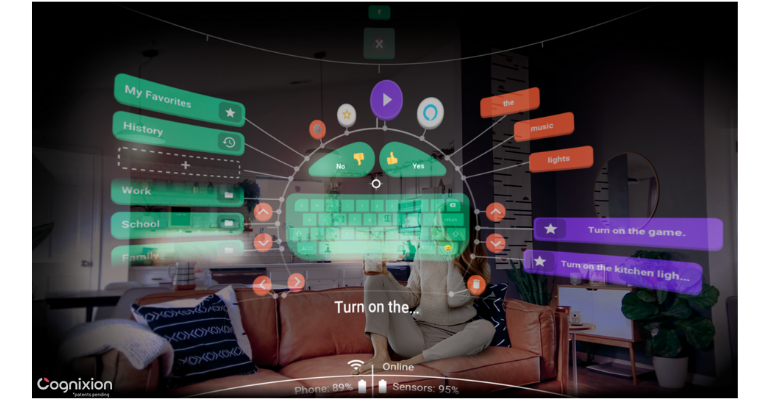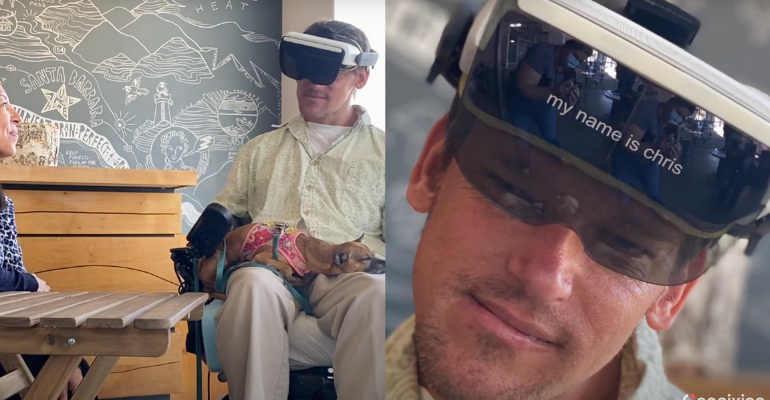What If Alexa Could Read Your Mind?
What if you could talk to Amazon Alexa using your mind? A new headset device using artificial intelligence (AI), augmented reality, and brain-computer interface technology could enable users to do that, and more.
Santa Barbar, CA-based Cognixion, a neural interface startup, just raised $12 million in seed funding to develop AI-powered neural interfaces that unlock speech and smart home controls for the hundreds of millions of people worldwide with communication and physical disabilities. The funding will help Cognixion develop new adaptive interfaces that make the assisted reality technology easier to use by everyone. Prime Movers Lab led the round with co-investors Northwell Health, Amazon Alexa Fund, and Volta Circle.
Cognixion’s wireless brain-computer interface with an integrated augmented reality display, Cognixion ONE, detects the signals from the user’s brainwaves associated with visual fixation on interactive objects and enables hands-free, voice-free control of augmented reality and extended reality applications in the headset. The company said the device is also designed to integrate with leading research software.
In addition to Cognixion ONE, the startup said it is building advanced machine learning algorithms and an AI-powered language system, which adapts to each user’s unique communication style, making it more efficient at recognizing and anticipating what they intend to communicate. A Cognixion headset user will be able to interface directly with Amazon Alexa from anywhere, accessing the smart assistant’s functions within the headset to interact with their environment and control smart devices, or access news, music, information, and more.

“Cognixion is solving usability and accessibility issues for [augmented reality and extended reality] and enabling new capabilities for people with disabilities today,” said Andreas Forsland, the company’s founder and CEO. “And in the near future, we see our innovations becoming a fundamental part of the metaverse, as a biological interface plus highly adaptive algorithms that unlock new use cases for [extended reality].”

“We believe that technology should be inclusive and universally accessible to every individual, and everyone deserves a solution that can adapt to their needs – and that it’s possible to build one solution that can be personalized for communication, information access, interacting with smart devices, and everything else life has to offer,” Forsland said.
He added that Prime Movers Lab, the venture capital firm that led the seed round, is “an extension” of the Cognixion team, helping the startup with hiring, marketing, government relations, and bulding a pipeline of prospective customers.
Why are VCs betting big on this high-tech augmented reality system?
“Cognixion has created a breakthrough human-machine interface that accelerates and enriches human communication and connection,” said Amy Kruse, a general partner at Prime Movers Lab. “You would think that Cognixion ONE is something out of science fiction if it didn’t already exist. We believe that it will be a fundamentally life-changing and integral blend of an AI software platform with hardware to assist people of all ages who live with speech and motor disabilities, including cerebral palsy, brainstem stroke, ALS, and many other conditions. Further, we see the broader expansion of this platform to extend to all users to enrich life experiences, including: gaming, apps, the metaverse, and beyond.”
Souhel Najjar, MD, senior vice president and executive director of the neurology service line at Northwell Health, SVP and Executive Director of the Neurology Service Line at Northwell Health, also gave the technology high praise.
“Cognixion ONE’s combination of visual stimulation and EEG reading could profoundly change the means of communication for patients with physical and neurological impairments,” Najjar said. “We look forward to collaborating with the Cognixion team as they develop this technology and assess its efficacy in addressing this significant challenge.”
Rich Mulry, president and CEO at Northwell Holdings & Ventures, said Northwell’s investment and expertise will support Cognixion’s expansion into healthcare provider markets.
What else is augmented reality being used for in medtech?
Activ Surgical is building a hardware-agnostic platform, including the ActivInsights augmented reality software suite, to enable autonomous and collaborative surgery through the integration of computer vision, artificial intelligence, machine learning (ML), augmented reality, and robotics. The company recently snagged $45 million in series B funding, bringing its total fundraising efforts to $77 million.
Activ said the new funds will support the commercial availability of the ActivInsights software suite, including the first Insight, an augmented reality overlay that displays tissue perfusion in real time without the use of traditional dyes. The company will also use the funds to support commercialization in the United States, pursue a CE mark, further enhance the ActivInsights software platform, and to develop its first ML-based insights.
Even Medtronic is getting in on the opportunity to leverage augmented reality in the medtech space. In April, the company signed a collaboration agreement to use interface Surgical Theater’s SyncAR augmented reality technology with Medtronic’s StealthStation S8 surgical navigation system. The partnership is intended to give surgeons an “augmented” look at complex cranial procedures.
Article source: Qmed and MD+DI










